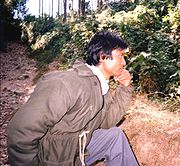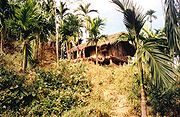
Toto tribe
Encyclopedia

Tribal Group
Tribal Group plc is a business services company based in London in the United Kingdom. It is listed on the London Stock Exchange and is a constituent of the FTSE Fledgling Index.Tribal provides services to the public sector, primarily within the UK....
residing only in a small enclave called Totopara
Totopara
Totopara is a small village on a hillock located 89° 20'E and 26° 50'N in the Jalpaiguri district of West Bengal, India.This village is home to the unique Toto tribe that is one of a kind in the world. The village is about 22 km from Madarihat, which is the entry point of the famous Jaldapara...
in the Jalpaiguri district
Jalpaiguri District
Jalpaiguri district is the largest district of North Bengal, covering an area 6,245 km2. It is situated between 26° 16' and 27° 0' North latitudes and 88° 4' and 89° 53' East longitudes...
of West Bengal
West Bengal
West Bengal is a state in the eastern region of India and is the nation's fourth-most populous. It is also the seventh-most populous sub-national entity in the world, with over 91 million inhabitants. A major agricultural producer, West Bengal is the sixth-largest contributor to India's GDP...
, India
India
India , officially the Republic of India , is a country in South Asia. It is the seventh-largest country by geographical area, the second-most populous country with over 1.2 billion people, and the most populous democracy in the world...
. Totopara is located at the foot of the Himalayas just to the south of the borderline between Bhutan
Bhutan
Bhutan , officially the Kingdom of Bhutan, is a landlocked state in South Asia, located at the eastern end of the Himalayas and bordered to the south, east and west by the Republic of India and to the north by the People's Republic of China...
and West Bengal (on the western bank of Torsa river
Torsa river
Torsa River rises from the Chumbi Valley in Tibet, China, where it is known as Machu. It flows into Bhutan, where it is known as the Amo Chu...
). Geographically the location is 89° 20'E 26° 50'N.
Totos were nearly becoming extinct in the 1950s, but recent measures to safeguard their areas from being swamped with outsiders have helped preserve their unique heritage and also helped the population grow. The total population of Totos according to 1951 census was 321 living in 69 different houses at Totopara. In 1991 census, the Toto population had increased to 926 who lived in 180 different houses. In the 2001 census, their number had increased to 1184 - all living in Totopara.
Anthropologists agree that the Toto culture and language is totally unique to the tribe, and is clearly distinguished from the neighbouring Rajbongshi
Rajbongshi
Koch Rajbongshi is an ancient tribe originally from the ancient Koch kingdom. The Rajbongshi tribe is referred to as Koch Rajbongshi, or Rajbanshi, or Rajvanshi. The word "Rajbongshi" literally means "royal community"...
s, Koch
Koch
Koch may refer to:* Koch , a type of Arctic boat* Koch people , an ethnic group originally from the ancient Koch kingdom in north east India* Koch , people with this surname* Koch, Łódź Voivodeship, a village in central Poland...
, Mech
Mech tribe
Mech tribe is one of the scheduled tribes of India and belong to Bodo-Kachari group of tribes. They belong to Mongoloid race and speak mainly Bodo language, which is a Tibeto-Burman dialect but have got influenced by the Assamese language. The Mech people live in the Dooars region of West Bengal...
or the Bhutan
Bhutan
Bhutan , officially the Kingdom of Bhutan, is a landlocked state in South Asia, located at the eastern end of the Himalayas and bordered to the south, east and west by the Republic of India and to the north by the People's Republic of China...
ese Sharchop
Sharchop
Sharchop is a collective term for the populations of mixed Southeast Asian and South Asian descent that live in the eastern districts of Bhutan.-Ethnicity:...
tribes.
Physical features and ethnic identity
The Totos are considered as Mongoloid people, with flat nose, small eye, broad and square cheeks, thick lips and small eyes and black iris. Their complexion is rather on the darker side, which reflects their nearness to the equator. They are generally endogamous and marry within their own tribe. They are generally divided into 13 exogamous clans or groups of families from which they choose to marry. They do not marry anyone related to them through their paternal uncles or maternal aunts.Toto language
Toto language
Toto is a Tibeto-Burman language spoken on the border of India and Bhutan, by the tribal Toto people. The Himalayan Languages Project is working on the first grammatical sketch of Toto.-References:*...
belongs to Tibeto-Burman family of sub-Himalayan group, as classified by Hodgson and Grierson. They do not have any script. Most of the young members can speak Bengali and Nepali, which are the mediums of instruction in the local schools.
Totopara: The Toto village
The area of entire Toto country called Totopara is 1996.96 acres (8.1 km²). It lies 22 km from MadarihatMadarihat
Madarihat is a small village located in the Alipurduar subdivision of Jalpaiguri district, West Bengal, India. This village is situated on the outskirts of Jaldapara Wildlife Sanctuary which is famous for Indian rhinoceros...
, the entrance of the famous Jaldapara National Park. So, we can safely assume that the Totos live near the northern edges of this forest. The Toto localities of the village are sub-divided into six segments - Panchayatgaon, Mandolgaon, Subbagaon, Mitranggaon, Pujagaon and Dumchigaon. Totopara also has a settlement of Nepali-speaking people. A primary school was established in the village in 1990. Later in 1995, a high school with hostel facility was also established there. There is one primary healthcare centre in Totopara.
Society
Toto family is patrilocal in nature dominated by nuclear type. However, joint family is not rare. Monogamy is common form of marriage among the Toto but polygamy is not prohibited. If a man's wife dies, he may marry the deceased wife's younger sister, but a woman cannot marry her deceased husband's brother. On the death of a spouse, the husband or wife must remain single for twelve months before he or she is free to remarry. There are various ways of acquiring mates viz., (1) marriage by negotiation (Thulbehoea), (2) marriage by escape (Chor-behoea), (3) marriage by capture (Sambehoea) and (4) love marriage (Lamalami). There is no custom of divorce among the Totos.Food habits
Though they make their main food from marua (a kind of milletMillet
The millets are a group of small-seeded species of cereal crops or grains, widely grown around the world for food and fodder. They do not form a taxonomic group, but rather a functional or agronomic one. Their essential similarities are that they are small-seeded grasses grown in difficult...
), the staple food of the Totos now includes rice, chura (parched rice), milk and curd. They also eat meat, generally goat, pork, venison, poultry and fish of all kinds. Women eat the same food as men and there are no restrictions of any kind on the widows.
Totos also drink a fermented liquor called Eu, made from fermented marua, rice powder and malt, which is served warm in Poipa (wooden glasses). Eu is drunk on all occasions.
Houses

Religion
They define themselves as Hindus, but the Totos have two main gods whom they worship:- Ishpa - He is supposed to live in the Bhutan hills, and causes sickness when displeased. The Totos offer him animal sacrifices and Eu.
- Cheima - She keeps the village and its people safe from troubles and sicknesses. She is also offered rice, fowls and Eu.
The Totos have no priests and offer their worship and sacrifices on their own. Ishpa is worshipped in the open outside the house and Cheima inside the house.
Of late, there are a few Christian converts among the tribe, largely attributed to Christian missionary works.
Economic activities
Totos cultivate land. The Totos are not active farmers and hence do not cultivate a particular crop to a great extent. Every home has a kitchen garden surrounded by bamboo fences; in these gardens they grow vegetables, potatoes and bananas, among others. Sometimes they trade with traders from the outside world. Some Totos raise cows and pigs as an occupation.At different stages of history, the Toto tribe has been moving away from a subsistence economy to market economy. Further, the transformations of the village from community ownership of land to individual land holding and from isolated tribal group to a multi-ethnic habitat have also taken place in the recent past.

